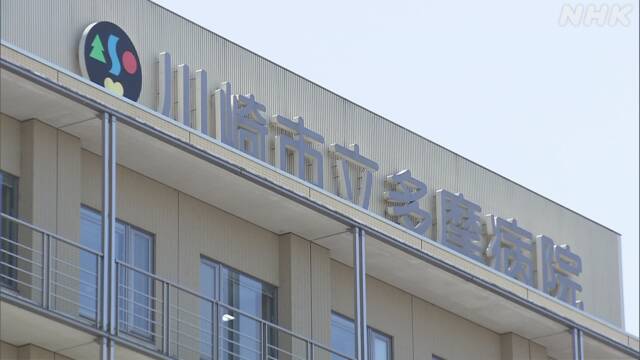At a hospital in Kawasaki City that accepts patients with moderate disease of the new coronavirus, the number of hospitalized patients, which temporarily decreased to two, increased to 16 last weekend, so the number of beds and nurses will be increased from the 26th. I took action.
Hospitals are raising a sense of crisis that the medical care provision system is becoming tight.
“Every department continues to be full”
At Municipal Tama Hospital in Tama Ward, Kawasaki City, 21 patients with the new coronavirus were hospitalized in January, the so-called third wave, but the number decreased to 2 on the 7th of this month. ..
However, after that, the number of patients began to increase, reaching 16 on the 21st of last week, and the beds that were ready for immediate use were full.
As of 26th, there were 13 inpatients due to some patients being discharged on the weekend, but more people will be hospitalized as the number of new infected people continues to increase, so more beds will be added. We decided to increase the number of nurses by 5 as well as increase the number of beds by 4.
In the ward, doctors and nurses in charge were busy on the 26th to administer medicines and check the condition of hospitalized patients, and when they were contacted to accept new patients, they prepared for bed adjustments. Was advancing.
Hatsumi Kikuchi, chief nurse of Kawasaki Municipal Tama Hospital, said, "In the 4th wave, the bed fills up faster than before, and I feel that many patients are getting sick. Therefore, we have to accept the patients in other departments, and all the departments are still full and the staff is quite difficult. I think that the current nursing system will not be able to stand up, so it is quite difficult to deal with it. I'm under pressure. "
The downward trend turned around and increased 8 times after 2 weeks
Since March last year, Kawasaki Municipal Tama Hospital has accepted a total of more than 2,200 patients with moderate disease of the new coronavirus.
During the so-called third wave, 21 people were hospitalized on January 7, the most, but after that, they recovered and were discharged or new hospitalizations decreased, so to 2 people on this month 7th. It has been reduced.
However, after that day, the downward trend turned around, and two weeks later, on the 21st of this month, the number increased sharply to 16 people, which is eight times higher.
Hatsumi Kikuchi, the chief nurse of Municipal Tama Hospital, said, "I feel that the bed has been filled up in a blink of an eye, and I think the number of patients is increasing faster than in the third wave. Two people have already died since the so-called fourth wave. I have the impression that many people are becoming more seriously ill. "
Increased number of beds Difficult to respond immediately
At Kawasaki Municipal Tama Hospital, the two wards used for neurology and urology have been switched to dedicated to the new coronavirus, making it possible to handle infected patients with a total of 32 beds.
However, due to the number and placement of nurses and doctors, it is usually half the number of 16 beds that can be used immediately.
In order to increase the number of beds that can be used, it is necessary to increase the number of nurses with the support of other clinical departments, but it is difficult to respond immediately because the work shifts of nurses are organized in each department. That is.
The mental burden on healthcare professionals is also an issue
At Kawasaki Municipal Tama Hospital, as we continue to respond to the new coronavirus, the mental burden on medical staff for over a year has become an issue.
Three nurses who worked in the corona ward have retired in the past year, and it is said that the nurses who are currently working do not have time to relax.
Chika Kamei (24), a third-year nurse who moved from another ward to a corona-only ward in February, said, "I work in this kind of place, so I don't go to places where there are many people with an increased risk of infection. My parents' home is in Tokyo, but I haven't returned across prefectures. It's physically and mentally necessary to re-study and wear protective clothing to deal with corona. I'm tired, but I want to do my best for the patient. "
Hospitals are also continuing to seek to prevent nurses from leaving their jobs, which is directly linked to the tightness of the healthcare delivery system.

